Fade Acne Scars
Acne scars come in two main forms, depressed scarring, and raised scarring. Both of these types are permanent skin structure changes that don’t go away on their own over time unless treatment is used.
Additionally, some people get discoloration and red marks on their face after acne, which is another form of acne scarring, although it is not technically classified as “scarring”, and is more likely to fade on its own without treatment. One of the easiest forms of acne scarring to get rid of is red acne scarring, since it usually only affects the top layer of skin.
Treatment will help both types of scarring. This post focuses on how to help depressed, indented scarring as well as acne scar discoloration. To treat raised acne scarring you can go into your dermatologist and ask for their recommendations, as the below methods are effective on indented and discoloration scarring, not raised acne scarring.
The process of fading acne scars can be speeded along with various products and treatment types.
All three types of acne scarring can be treated by a professional dermatologist as well, so making time to get a professional opinion and recommendations is always a good idea.
Why do Acne Scars form?
Acne scars form when deep or cystic acne is healing and the body makes either too much collagen to form a raised scar, or too little collagen to form an indented scar.
The body rushes healing acne wounds because it is trying to avoid bacteria or an infection forming in the skin, which is why the skin heals less smoothly than your original healthy skin. This textural change in the skin that results from acne healing is what is known as an acne scar.
Indented acne scarring:
When too little collagen is produced by the body, the acne scar is indented and depressed into the skin, looking like a little indent or hole in the skin, or a collection of indents next to each other.
Raised acne scarring:
Raised scarring forms when the body produces more collagen than necessary during acne healing, and this type of acne scar is more common for African American, Hispanic and Asian skin types.
Red or Discolored Acne Scarring:
When some acne heals it leaves behind a red mark or discoloration, which is the easiest type of acne scarring to treat and often fades on its own over time, but can be helped to fade more quickly with treatment.
How to Fade Acne Scars Fast
How to Fade Discolored Acne Scars Fast:
There are several ways to fade discolored acne scarring with at-home treatments including:
- Vitamin C serums: Vitamin C is an ingredient found naturally in the skin and is part of the collagen production process, accelerating skin repair and healing. This is why it is so helpful in helping skin repair and heal acne scarring, particularly discolored scarring, but can also be used in combination with micro-needling to help heal indented acne scarring.
- Salicylic acid: Products that contain salicylic acid helps surface level dead skin slough off which helps improve the appearance of discolored scarring by assisting in taking off the top layers of discolored skin so the newer healthy, non-discolored skin can start to emerge underneath. This method is best used in combination with other methods as it is not strong or fast on its own.
- Exfoliation creams: Exfoliation creams work to loosen and remove the utmost top layer of damaged acne scarred skin so it can come off to reveal new non-discolored skin underneath and are great to use to assist skin turnover and see improvement over time.
- Natural oils: Oils including argan oil and coconut oil can help moisturize the skin so it has the moisture it needs to use its own natural repair processes and will help improve the appearance of skin over time, especially when used in conjunction with exfoliation and Vitamin C serum methods.
How to Fade Indented Acne Scars Fast:
Indented acne scars take longer to heal and deeper treatments to see improvement, since they have changed the skin more deeply at a structural level and affect more layers of skin than a superficial top layer discoloration mark.
The good news is there are at-home and in-clinic methods to fade indented acne scarring quickly including the following methods:
At-Home Treatments to Fade Indented Acne Scars Fast:
There are several home remedies for acne scars that work quite well:
- Microneedling: Microneedling has been found effective in numerous skincare studies in helping stimulate skin repair in regard to acne scarring. It can be done professionally in-clinic or at home with shorter needles using a 1mm or 1.5mm derma-roller or a .5mm derma-pen.
Microneedling is one of the best ways to help fade indented acne scarring fast because it goes past the top layer of skin to stimulate the body’s natural healing process in the deeper layers of the scarring. This allows the body to have another chance to heal the scarred area, this time leaving the skin smoother. Microneedling also helps the body remove the top damaged layers of skin more quickly while also stimulating the skin’s healing process at the same time.
The last benefit of at-home microneedling is it opens the skin up to receive healing product ingredients deeper into the skin so they can work at a deeper layer and be more effective to speed up the healing process.
- Copper Peptide Cream: Copper peptide cream is one of the building blocks of skin and assists the skin in the healing process. It has been found in many studies to help the healing process of skin, and is great to use on its own, and especially in combination with microneedling so it can go deeper into the skin for maximum effectiveness, to help indented acne scarring heal. It is best used at nighttime due to its bright blue color.
- Vitamin C Serum: Vitamin C can’t be used layered on top of copper peptide cream because the copper peptides would oxidize the Vitamin C and take away its effectiveness. Instead, the most effective way to use the Vitamin C to heal indented scarring is to apply it directly after microneedling as well as in the morning, or apply copper peptides at night after microneedling as your nightly skincare routine, then in the morning apply Vitamin C as part of your daily morning skincare routine. Vitamin C is great for boosting collagen and skin repair so it is also helpful in improving the appearance of indented scarring, especially when paired with microneedling.
- Exfoliation Cream: Exfoliation creams can also help with indented scar improvement, when applied as part of the morning skincare routine, it helps damaged skin turnover and come off more quickly. The skin heals layer by layer, so the more damaged layers that come off, the more the skin fades acne scarring and starts to show the healthy new skin underneath.
In-Clinic Only Treatments to Fade Indented Acne Scars:
- In-Clinic Microneedling: To remove the top layer of damaged skin and stimulate skin healing underneath using deeper needle tools in a professional clinic setting.
- Fillers, a filler is where a dermatologist injects your skin with collagen to lift indented skin, however the effects are only cosmetic and temporary.
- Subcision, subcision is where a trained punctures your skin with a needle to release the tether in your scarred skin for an attempt to heal it at the root.
- Lasers, including Fraxel and others, are where a professional uses a laser to remove the top layer of your scarred skin which can removed damaged scarring as well as encourage new tissue growth in the days to come.
- Chemical Peels, chemical peels work similarly to lasers in that they remove the top layer of damaged skin which also encourages new healthier skin growth underneath
Fading Acne Scars Fast with Vitamin C
Vitamin C is a great topical serum you can use daily either alone, or in conjunction with micro-needling to fade acne scarring.
Studies have found Vitamin C to be a “potent antioxidant drug that can be used topically in dermatology to treat and prevent changes associated with photoageing. It can also be used for the treatment of hyperpigmentation.”
Vitamin C is a natural antioxidant that is also already found in plentiful supply in your skin and is an important part of your body’s collagen production process.
It’s important role in skin repair is part of why it is so great at fading discoloration including acne scars, and at treating other skin discoloration issues such as hyperpigmentation.
Vitamin C serums that contain Vitamin C, Vitamin E, and Ferulic Acid, have been found to be the most effective, so choose a serum that contains all three ingredients to get the maximum effects.
Copper Peptides & Fading Acne Scars
Copper Peptides are skin building blocks, and have been shown to help the skin heal in several wound-healing studies. They also support the production of collagen and elastin in the body, two necessary skin reparation elements.
Studies, including the Pickhart Margolina study found Copper Peptides to possess these properties that help with skin healing:
- Tighten skin that is loose
- Reverse thinning of aged skin
- Repair protective skin barrier proteins
- Increase skin firmness, elasticity, and clarity
- Decrease fine lines, depth of wrinkles, and improve structure of aged skin
- Smooth rough skin
- Decrease photodamage, mottled hyperpigmentation, skin spots and lesions
- Improve overall skin appearance and look
- Help stimulate wound healing
- Protect skin cells from UV radiation
- Decrease inflammation and free radical damage
- Increase hair growth and thickness, enlarge hair follicle size
Copper peptides help the skin repair itself, and can be used to help with wrinkles and aging skin, as well as help with wound healing and fading acne scarring.
The Pickhart study explains that “The human peptide GHK (glycyl-l-histidyl-l-lysine) has multiple biological actions […] It stimulates blood vessel and nerve outgrowth, increases collagen, elastin, and glycosaminoglycan synthesis, as well as supports the function of dermal fibroblasts. GHK’s ability to improve tissue repair has been demonstrated for skin, lung connective tissue, boney tissue, liver, and stomach lining.”
GHK copper peptides have been proven to increase collagen, elastin, glycosaminoglycan synthesis, and even improve tissue repair both inside the body and on the body’s skin.
Due to its powerful ability to stimulate skin repair, it is a useful cream to include into your acne scar healing and fading routine, especially when used alongside micro-needling to help give your skin what it needs to repair at the root of your scarring and remove damaged layers over time.
The Skin Biology copper peptide study site explains specifically how copper peptides work to promote skin healing:
“Studies have shown that copper peptide promotes the production of collagen and elastin in your skin. It also acts as an antioxidant and promotes production of glycosaminoglycans (such as hyaluronic acid).
Studies have also shown that copper-dependent enzymes help firm, smooth, and soften the skin quicker than most other anti-aging skin care products. In addition, copper peptides have been shown to remove damaged collagen and elastin from the skin and scar tissue.”
They promote collagen and elastin growth in skin and help to firm and smooth the skin as well as help take out damaged collagen and elastin from the skin’s scar tissue.
The Regene Pure site explains that copper peptides help increase oxygen in blood vessels so they can produce new blood vessels to aid in the skin healing process, something that is also associated with aerobic exercise, which when done leads to better circulation and bodily healing:
“Copper peptides assist in this increase of oxygen with their ability to produce new blood vessels from previous vessels. This process is known as angiogenesis and is often associated with certain forms of exercise. Similarly to our bodies when we perform aerobic and endurance exercises, when copper peptides increase the amount of blood vessels in our hair follicles, the amount of nutrients and oxygen is also increased, ultimately leading to healthier circulation and hair growth.”
Copper peptides effect on oxygen and blood vessels help increase circulation which help hair and skin be able to grow and repair which is helpful for those who want to help their body repair acne scar damaged skin.
“Copper peptides are also popularly known for repairing skin. Not only are copper peptides supposed to assist with hair growth and microcirculation, but they have also been shown to encourage the production of collagen and elastin. Collagen and elastin are both structural proteins that can be found in connective tissue. As we age, we start to lose both of these which results in saggy skin and wrinkles. This is probably one of the main reasons why you will be able to find copper peptides on the ingredient list on many anti-aging products.”
In addition to their effects on blood vessels, copper peptides are known to increase collagen and elastin production, both skin structural proteins that help the skin repair, including the repair and fading of acne scarred skin.
Fading Acne Scars with Micro-needling
The Derma Health Institute explains that micro-needling is effective in part because it helps the skin remove its top layer, and at the same time stimulates collagen production and new skin cell development.
Even when used on its own, micro-needling can be a powerful acne scar fading and healing tool. You can only micro-needle once every 3 weeks or so because you need to give the skin time to heal and produce new skin cells in-between each session.
It is even more effective when you microneedle, and then put a copper peptide healing serum on as your nighttime routine and use a Vitamin C serum as part of your morning routine, so you are giving your skin what extra ingredients that promote healing so you can see the best results from your micro-needling.
The Health Institute goes on to talk about how you see the benefits of micro-needling over time as the skin heals and collagen begins to build in the skin. The Institute explains that when you combine that with good sun protection and exfoliation, you’ll start to see the best results.
Micro-needling is a great tool to help skin heal from and fade the appearance of acne scarring because it is able to stimulate your skin’s healing and collagen production response, kickstarting a process into gear that will continue healing and improving skin texture for months after you do your at-home or in-clinic treatment.
It’s a great acne scar healing tool, and the one shown to be most effective in many acne scar skin healing studies. It’s also my personal favorite acne scar healing tool.
One study, Phuong Pham Thi Minh et al study, found derma-rolling improved the appearance of indented acne scars in all 31 people included in the study who derma-rolled each week for a three month time period.
My experience combining at-home micro-needling and copper peptides has changed my entire face and skin texture for the better. Here is a before, process, and after picture that illustrates how the two have helped my skin:
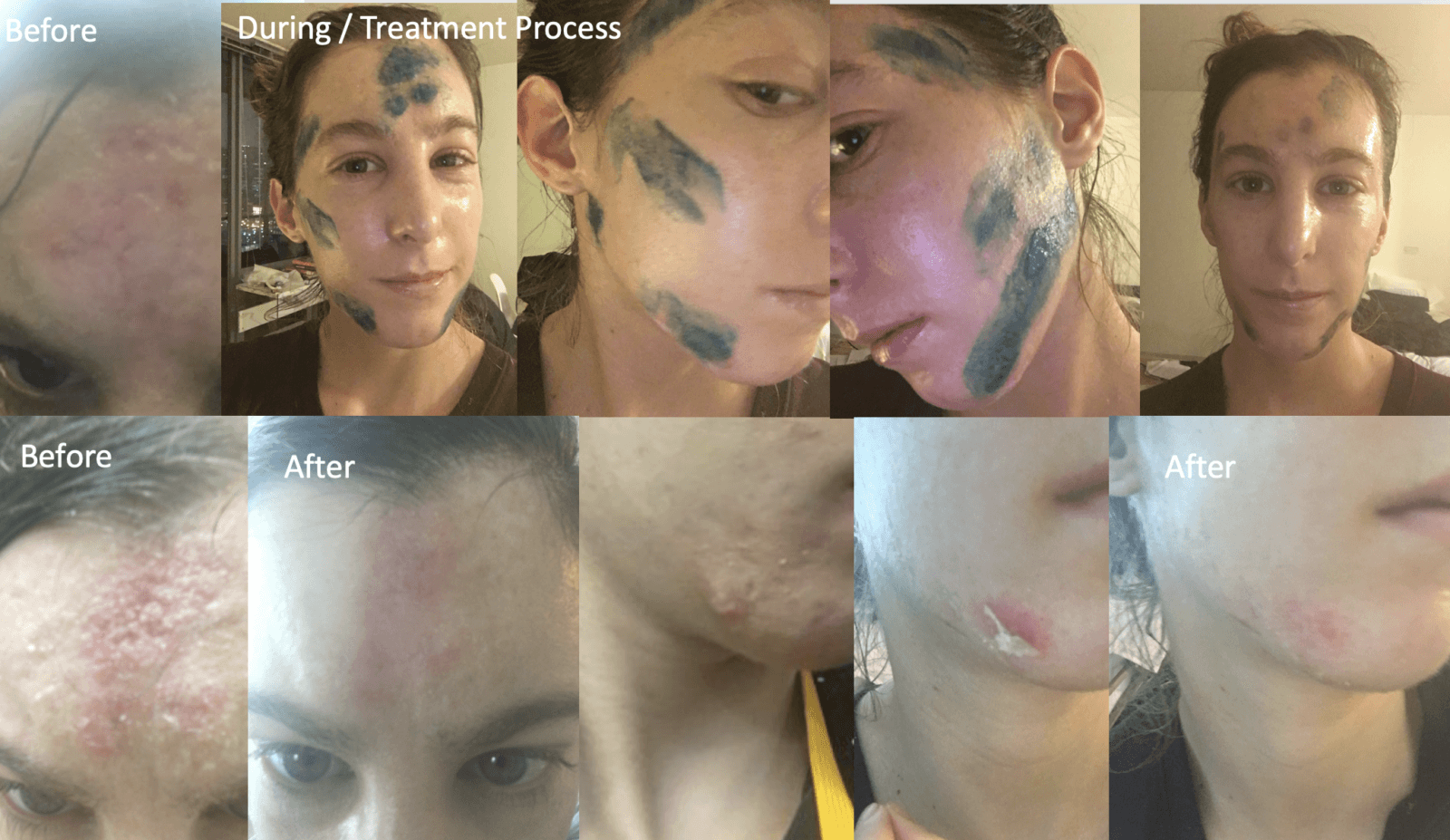
The left images shows my scarring, the top shows the bright blue copper peptide cream which I apply after micro-needling, and as part of my nighttime routine, and the after photos show how my skin has improved throughout the process. More acne scar before/after photos can be viewed here.
Note: it is important to keep inflammation as low as possible during the acne and acne scar healing process. This is why occasionally I like to ice on my inflamed active acne to calm its inflammtion, as well as ice my acne scarring to keep inflammation down during the healing process. I know some of you have asked, is ice good for acne scars? The answer is yes, in the sense you will see a temporary reduction in acne scar size when you ice it and for a bit after, and it helps keep inflammation down which does help during the healing process. It is not a permanent solution, and is best used in combination with other types of treatment.
Fading Acne Scars with Exfoliation
In addition to micro-needling once every few weeks, applying copper peptides at night, and Vitamin C during the day, using an exfoliating cream daily and lightly exfoliating once every few days can do a lot to help fade acne scarring.
Damaged skin will come off faster when you put on a light layer of exfoliation cream, such as LacSal cream, daily to help it loosen.
Putting a layer of exfoliating cream on skin and letting it sit is the least abrasive exfoliation method and will encourage damaged scar tissue and skin to come off faster over time, resulting in the fading appearance of acne scarring, especially when used in conjunction with the other methods mentioned above.
The Skin Biology site talks about how exfoliation creams help dissolve and loosen damaged skin to expose healthy skin underneath, an important process when you’re looking to improve the appearance of skin including acne scarring:
“Hydroxy acids, such as salicylic acid and glycolic acid, are widely used as exfoliating agents and for skin peels. They remove dead skin cells and also loosen and slowly dissolve skin lesions such as acne scars, keloid scars, surgical scars, burn scars, moles, skin tags, stretch marks, age spots, and sun damage marks.”
Personally I love using exfoliation cream daily on top of my Vitamin C serum and see my damaged skin loosen and come off more quickly. The results are very apparent over time, and putting the cream on makes skin look smoother and gives your skin a healthy smooth glow immediately as well.
The Nature Science Journal talks about why exfoliation works so well to improve skin. The Journal explains that damaged skin is weaker in structure than healthy skin, which is why exfoliation works so well in removing weaker, damaged scar tissue skin, while leaving healthy smooth skin on the face.
When you use exfoliation creams and exfoliate using other methods, you’re able to more easily remove the damaged acne scar tissue skin from your face while the rest of your healthy, smooth skin stays intact, due to the weaker structure of the scarred skin.
Acne Scar Fading Pictures
I personally have used at-home microneedling, copper peptides at night, and Vitamin C + Exfoliation creams during the day for the past year, and have seen huge improvements in my acne scarring.
My scarring has faded to the point I don’t think other people even notice it now, and I finally feel comfortable in my skin again.
Here is a before and after image of my scarring and how it has faded with these at-home treatments over the past year:
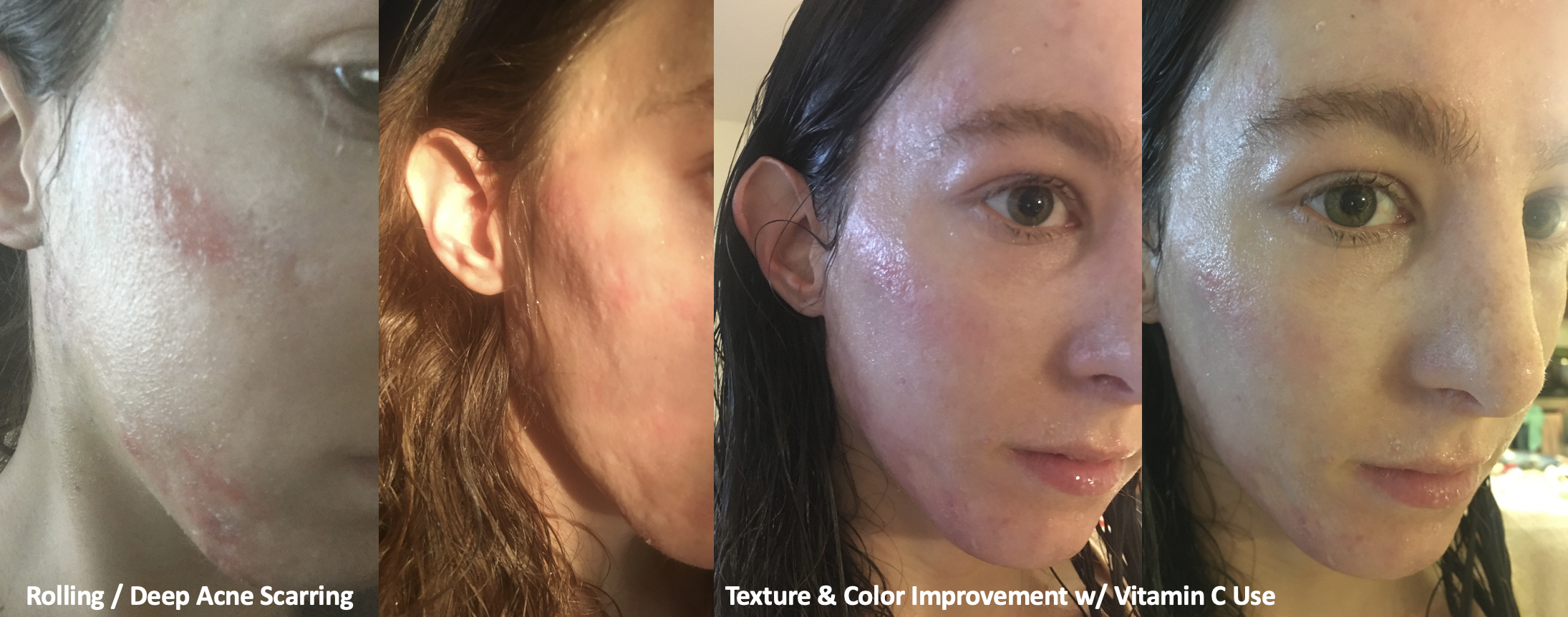
Acne Scar Fading Results
Personally I have used at-home micro-needling, copper peptides at night, and Vitamin C as well as LacSal exfoliation cream during each day, and these are the acne scar fading results I’ve seen in a little over a year timeline:
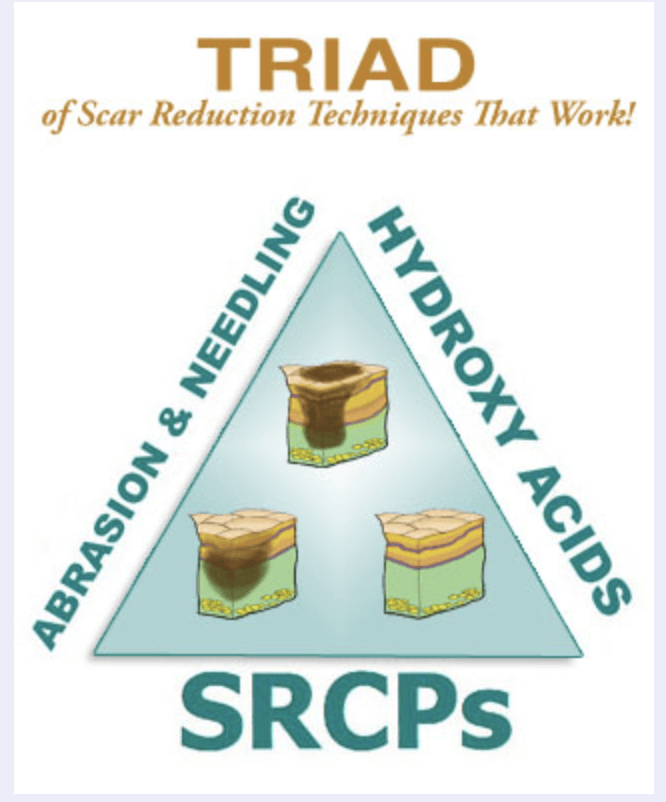
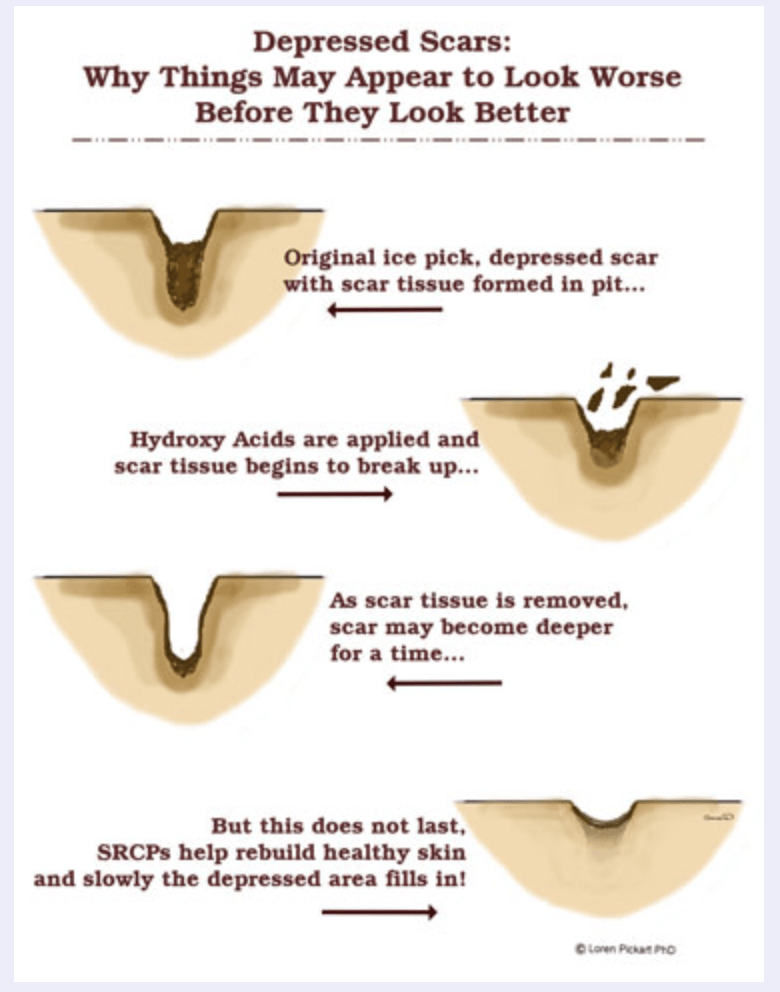
Here are a few more photos that show my skin healing over this time period:
Here 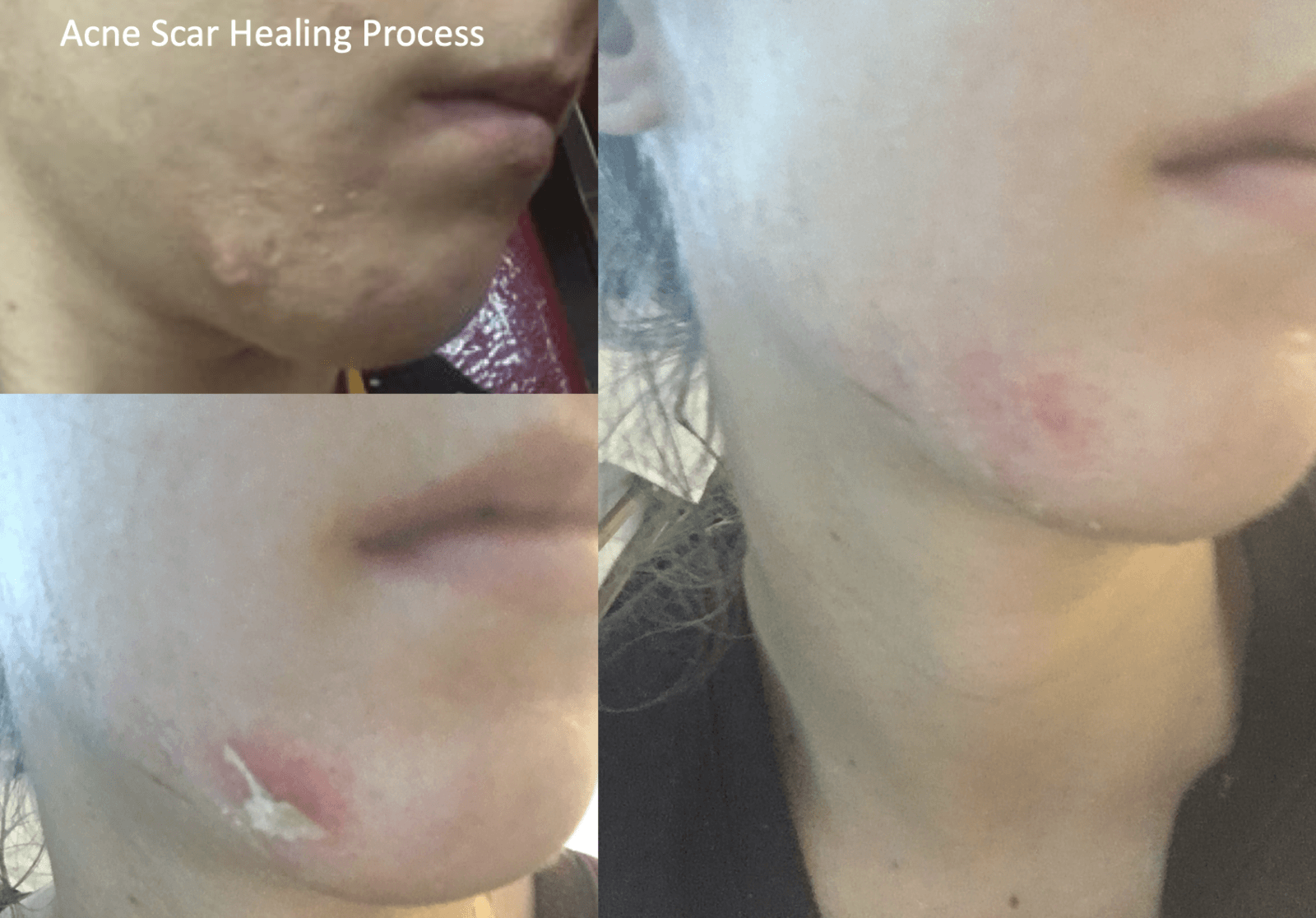
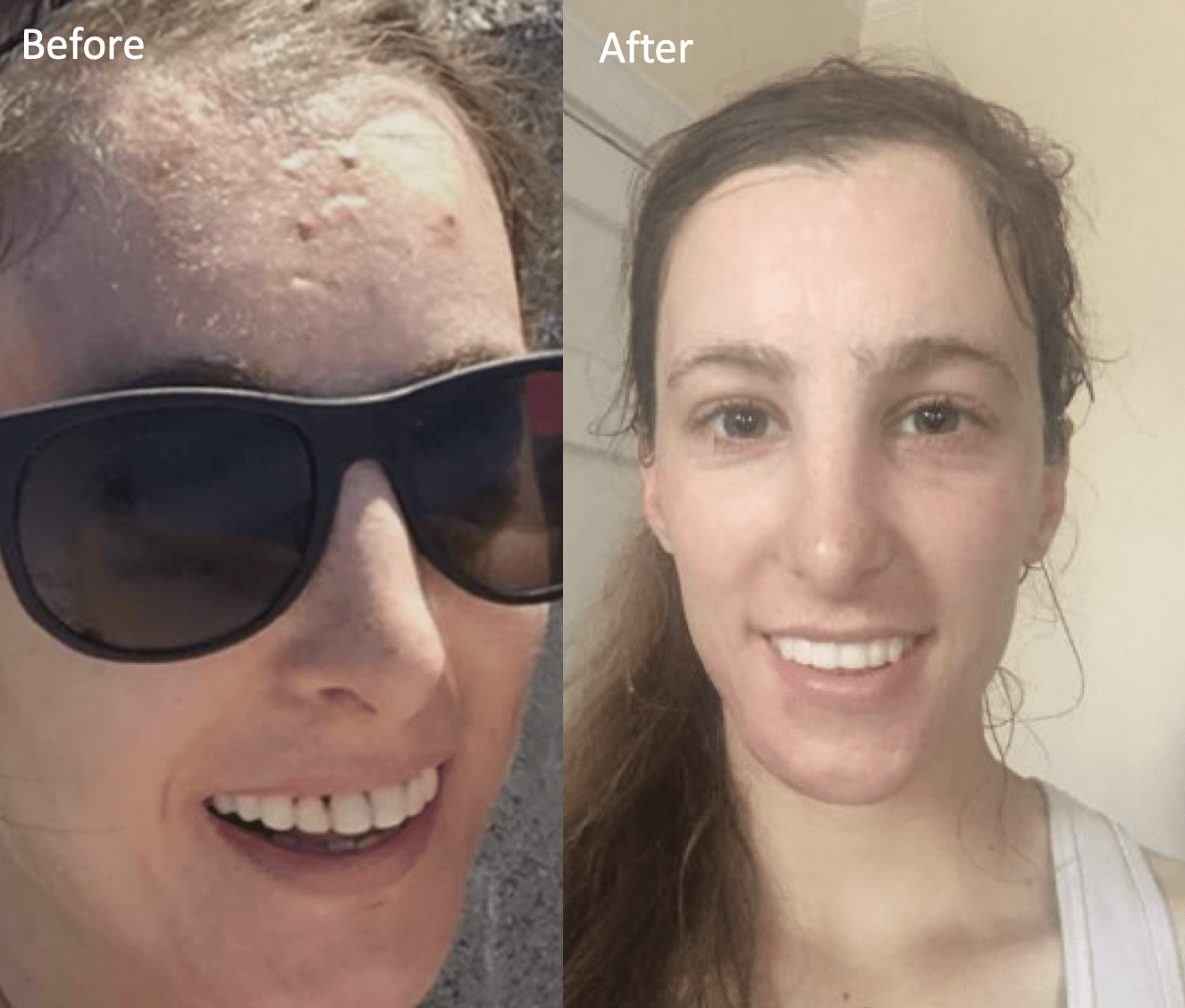
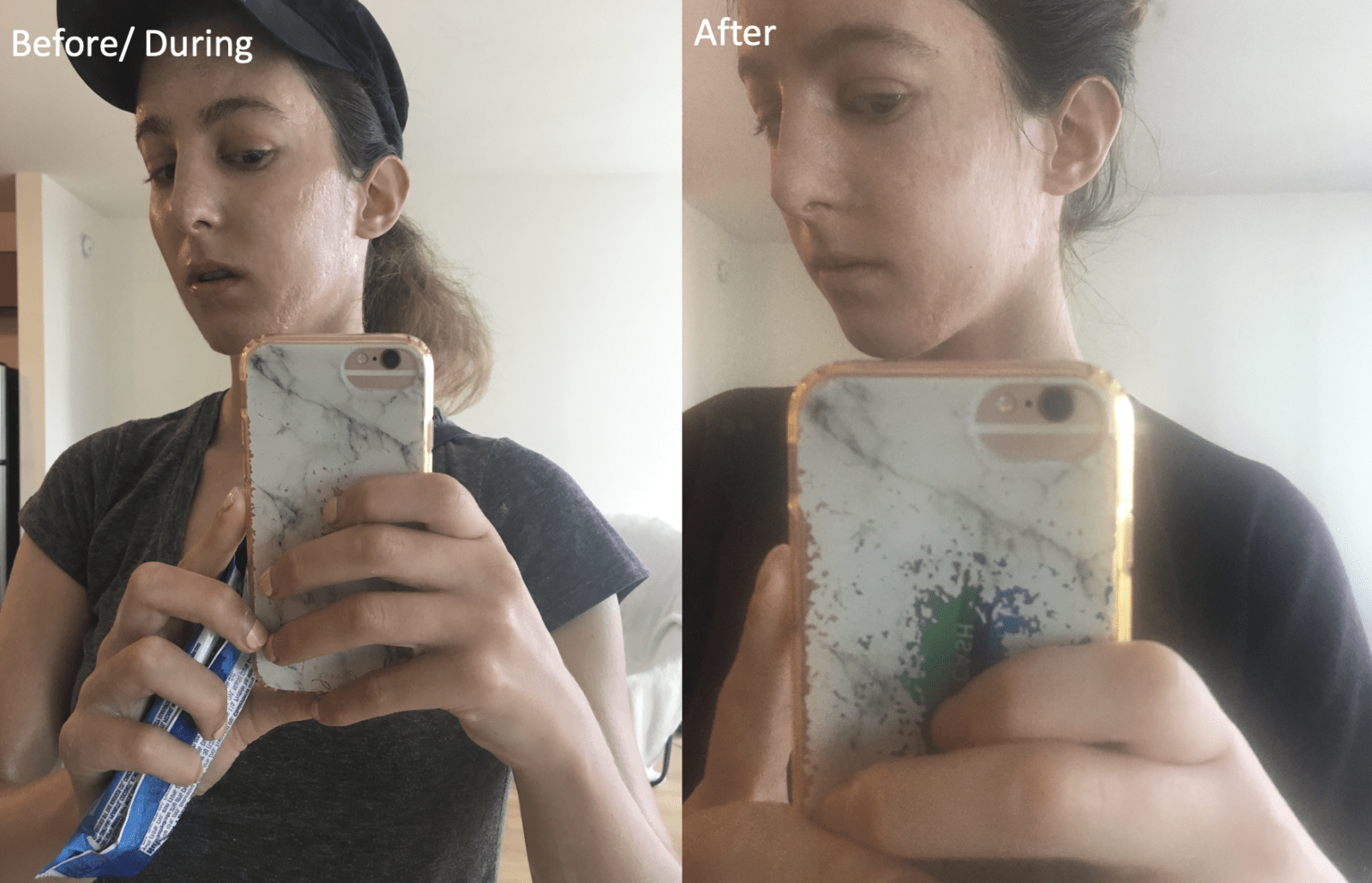
I am very grateful to have found this at-home scar healing process that includes micro-needling, copper peptide serum, Vitamin C serum, and exfoliation cream, and my skin has benefited tremendously from following this process for over a year now.
Here are the specific acne scar fading products I’ve used this past year.
More before and after of my acne scar photos are here to look at as well.
